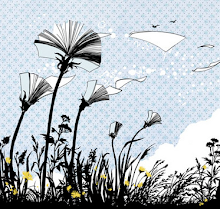(2004) Pg.315 (individual essays range from 2 - 5 pages)
Cut to the Chase: 3.5 out of 5
The Sound of Paper wasn't exactly what I expected it to be. I went in thinking it would be a cohesive piece, something like a memoir. What it turned out to be was a collection of short essays about how to deal with dry spells in creativity. I can only describe her writing style as whimsical. She reminds me of my college rhetoric prof. and my creative writing prof. rolled into one. I should have picked up this book weeks ago, when I was having my own spat with my muses. Julia Cameron's short essays (and I mean short. Most of them are no more than three pages.) offer gentle advice in such a personal way, it doesn't feel like she's demanding you to heed her advice. The essays read more as descriptions of what she does herself that she finds to work. She focuses on herself and her process, which takes the emphasis off the advice giving part.
Each essay is set up with an "exercise" at the end. The exercises, even more so than the essays, are set up for you to "get to know yourself." If you're looking for something to prompt the writing of fiction or whatever the medium, this is not what you'll find. Regardless, the advice she gives can be helpful, if you know how to take and utilize advice. Her main points are:
~ Write (or create) everyday, even if you aren't feeling creative
~ Take walks to find new perspectives
~ Be open to your surroundings and creating "just for fun"
~ Take walks to find new perspectives
~ Be open to your surroundings and creating "just for fun"
The best way to use this book is to take what you can and not to read from cover to cover. Some of Cameron's advice and ideas can be a little strange. She has a unique take on God and spirituality, and like all professional writers/composers, thinks that everyone has all the time in the world to pursue their creative outlets. Sometimes, you just can't write everyday. Everything is different for every person. Take what you can. Even a small piece of advice could break the dam of writer's block or creative dryness.
Also, you don't want to read The Sound of Paper from page 1 to page 315. After awhile, the morals of the essays gets repetitive and hard to slog through. The best way to read this book, I find, is to flip to a random page or a random essay and read one (or a few) whenever you're feeling blocked.
Overall, I found The Sound of Paper helpful. I liked the gentle and whimsical style, and the advice proved to be helpful, if taken with a good dose of moderation and tailoring it to your personal life and style. However, after awhile, she starts to sound repetitive, and some of her advice is way out there. I'd recommend The Sound of Paper to any writer or creator, blocked or otherwise.
Also, you don't want to read The Sound of Paper from page 1 to page 315. After awhile, the morals of the essays gets repetitive and hard to slog through. The best way to read this book, I find, is to flip to a random page or a random essay and read one (or a few) whenever you're feeling blocked.
Overall, I found The Sound of Paper helpful. I liked the gentle and whimsical style, and the advice proved to be helpful, if taken with a good dose of moderation and tailoring it to your personal life and style. However, after awhile, she starts to sound repetitive, and some of her advice is way out there. I'd recommend The Sound of Paper to any writer or creator, blocked or otherwise.








0 comments:
Post a Comment